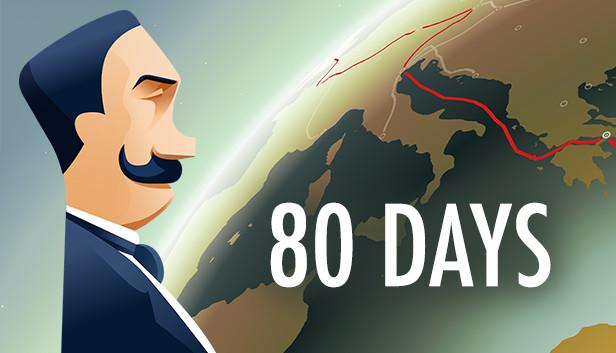★★★★★★✰✰✰✰
[6/10 stars]
My sister and I decided to play “80 Days” on the iPad. However, when we first launched it, we sat at the first line of narrative for a solid 3 minutes. Confused at why it was not loading, my sister relaunched the game, before being sent to the same screen again. Swiping the screen, we let out a huge “ohhh.” The first impression was an unclear interface to navigate. However, with its simplistic layouts and minimal controls, we soon figured out how to play with few instructions. One point of contingency was when we could not get the iPad version to have audio for our end, so we sat there playing the game in silence. Unluckily, there were no bustling sounds of the cities or trains to keep us engaged, but we looked past this as we were excited to explore the immersive world and begin traveling across it!
With no prior knowledge of the game or the preceding adventure novel, I didn’t know much about the game itself. After reading the initial dialogue, my sister and I were able to grasp the premise behind the game. “80 Days” is a narrative-driven game centered around a unique storytelling mechanic, where players take on the role of Phileas Fogg’s loyal valet, Passepartout, as they attempt to circumnavigate the globe in just 80 days. One cool feature about the game is its highly branching narrative, with over 150 cities to visit and multiple routes to take, each with its own set of challenges and consequences. As you begin your journey, you get to pack random items that are different with each run. Some items lead to differently generated conversations with NPCs throughout the world, allowing for a unique experience each play through. However, this concept can prove ‘tilting’ at times, as one wrong click could lead your relationship with Fogg to tumble or cause you to lose out on a few pounds. As someone who has a difficult time making decisions, I dreaded having to choose between two trivial responses that could completely change the course of the game.
Despite my personal experience, the game does an excellent job of storytelling and world building. Like Jayanth writes in “Forget Protagonists: Writing NPCs with Agency for 80 Days and Beyond,” many of the NPCs have agency, or intentional and meaningful interactions (Jayanth, 2016). They were written brilliantly to play their role as a train ticketer or resident of a specific city, not to please or just to interact with the White protagonists (although some may fall short of doing so). The NPCs add a layer of dimension within the world, and help towards subverting the concept of “white protagonism,” when two of the main characters are white characters themselves. Another way the game creators avoided “White Protagonism” was through allowing for your characters to suffer, whether that be through death, imprisonment, or other consequences of your choices. However, it is still important to recognize the concept of “Imperial Pleasures” throughout the game, such as how the premise is a privileged, White man who simply wants to travel the world for a silly bet. Fogg is often disinterested in different cultures around the world, as his only goal is to conquer city by city in order to ensure his wealth is retained. It highlights “Imperial Pleasures,” as Fogg has little to worry about and follows the rhetoric of a capitalist-colonialist protagonist, as Jayanth describes in her article (Jayanth, 2021).
Overall, the game itself was a refreshing experience as my sister and I navigated around the world, restarting a few times in frustration. The story-style game is one that did not immerse me too much, personally, for a few reasons, but I’m glad I got to try it. The work of the game developers shone tremendously through the personalized gameplay and agency of the NPCs, and it is one I would recommend to those who like “choose-your-adventure games.”
Citations:
Jayanth, Meghna. “White Protagonism and Imperial Pleasures in Game Design #DIGRA21.” Medium. 30 Nov. 2021, https://medium.com/@betterthemask/ white-protagonism-and-imperial-pleasures-in-game-design-digra21-a4bdb3f5583c
Jayanth, Meghna. “Forget Protagonists: Writing NPCs with Agency for 80 Days and Beyond.” Medium. 5 Jun. 2016, https://medium.com/@betterthemask/forget- protagonists-writing-npcs-with-agency-for-80-days-and-beyond-703201a2309



I thought that your point about how imperial pleasures in the game is reinforced through Fogg’s bet was very insightful. I wonder if we changed the premise to something else instead how radically the story would change. What if the goal was to share resources with other communities in 80 days, rather than explore/conquer every city?
Hi Ngoc,
Thank you for playing 80 days with me. I shared a similar frustration on our initial play-through. I think narration based games aren’t genres that I have enjoyed in the past. It was also pretty stressful to make decisions and have the outcome of the game reflect them. Similar to Amy, I thought your point about how Fogg was only interested in conquering each city and how the characters are allowed to suffer counteracts the “white protagonist” ideals.